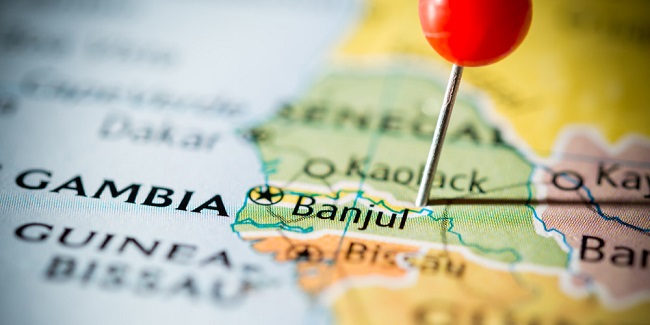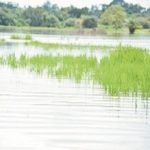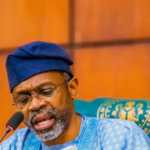The Republic of the Gambia is an English-speaking West African country with its capital in Banjul. The Gambia is surrounded by Senegal on three sides, with 80 km (50 mi) of coastline on the Atlantic Ocean marking its western extremity. The Gambia has a total size of 11,295 km2 and is less than 50 km (31 mi) broad at its widest point (4,361 sq mi). The Gambia has a land area of 1,300 square kilometres (500 square miles), or 11.5%, of which is covered by water.
On February 18, 1965, The Gambia became independent as a constitutional monarchy within the Commonwealth, with Elizabeth II serving as Queen of The Gambia and being represented by the Governor-General. A second referendum resulted in the Gambia becoming a republic on April 24, 1970, under the Commonwealth. Prime Minister, Sir Dawda Kairaba Jawara took over in this executive position that combines the roles of head of state and head of government.
1. CLIMATE
The Gambia experiences tropical weather. From June through November, there is typically a hot and rainy season; but, from December through May, colder temperatures and less precipitation are more common.
2. POPULATION
According to worldometers, the current population of the country is pegged at 2,566,145 as of Friday, September 16, 2022, based on Worldometer elaboration of the latest United Nations data, with a forecast of 4,882,101 by 2050.
3. NATURAL RESOURCES
The country has limited natural resources consisting of laterite, titanium, rutile, ilmenite, tin, zircon, and silica sand.
4. ETHNIC GROUPS
The most populous ethnic group in The Gambia is Mandinka, others include, Fula, Wolof, Jola, Soninke, Serer, Manjago, Bambara, Aku Marabou, and others.
5. LANGUAGES
Apart from English which is the official language of the country, other languages spoken in the Gambia include Mandinka, Pulaar, Wolof, Serer, Jola, Arabic, and Balanta among others.
6. LITERACY LEVEL
As of 2015, The Gambia’s adult literacy rate was 50.78%, according to UNESCO. While the literacy rate for men is 61.77%%, it is just 41.58% for women, demonstrating a significant discrepancy between the sexes. In comparison with other countries, The Gambia has a low literacy rate.
7. FOOD
In terms of food, Gambia undoubtedly has one of the best traditional dishes which shows the country’s conservative cultural values. Some of the most popular foods in the Gambia include Domoda, Plasas, Afra/Dibi, Olele, Chicken Yassa, Ebbeh, Benachin, Chakery, Supakanja, and pepper soup.
8. VISA POLICY
According to Visaindex.com, the Gambia visa is currently ranked at 77 with 68visa-freee destinations with the passport.
In accordance with the Gambia visa policy, Nigeria is one of the 104 countries whose citizens can visit and stay in the country for up to 90 days without the need for a visa. All that is needed to be done by the citizens of these countries before entering the Gambia is to present a valid passport to prove their nationality at the port of entry and enter the Gambia without any hassle.
Also, citizens of about seventeen countries are exempt from requiring a visa to visit the nation, but they must obtain entry clearance from Gambia immigration before departure.
Visa on Arrival is equally available for citizens of four countries, namely France, Portugal, Spain, and the United States of America and can stay in the country for a maximum duration of 28 Days.
The citizens of these countries can apply for a visa after arriving in the country.
Requirements for Visa on arrival
The nationals must possess a passport that is at least six months old and other supporting documentation in order to apply for this sort of visa. The traveller must go to the border checkpoint, present the application, and pay the required visa price to receive a Visa on Arrival.
According to the Gambia Visa Policy, apart from the above, travellers from other nations of the world must first apply for a Gambia tourist visa.
9. GAMBIA TOURIST VISA
Passport holders who use this tourist visa are permitted to enter the country and stay there for up to 30 days. This type of visa has a maximum validity of one month for single-entry visas and six months for multiple-entry visas.
- Requirements for a tourist visa
- Application Form (Two duly completed and signed application forms)
- Two Photos
- Passport and the Main Page of the Passport
- National Identity Card and Resident Permit/Visa Copy (if Your Country of Residence and Citizenship are Different)
- Flight Ticket Reservation
- Proof of Financial Means
- Proof of Accommodation
- Proof of the Purpose of Visit
- International Yellow Fever Vaccination (If required)
Travellers visiting from countries with a high risk of transmission of yellow fever or infected areas must present a vaccination certificate of yellow fever
- Official Police Report ( Must be translated into English)
It should be noted that you may also be asked to provide additional documents at the embassy.
- Duration of processing
A Gambia Tourist Visa typically takes 3-7 working days to process. It is determined by the country where you apply for a visa.
- Visa Fee
The price for a Gambia tourist visa is between $50 and $100. The charge may differ based on your nationality or the country in which you submit your application
- Where to obtain a Gambia tourist visa
You can apply for a Gambia Tourist Visa at one of the Gambia visa application centres, embassies, or consulates in your country of residence.
Examples of some of the countries whose citizens need visas to enter the Gambia include Afghanistan, Algeria, Angola, Argentina, Azerbaijan, and Bahrain.
10. GAMBIA BUSINESS VISA
Citizens of different nations of the world who wish to conduct business or visit the Gambia for a longer time will need to apply for a Business visa. This visa category allows citizens to stay in the nation for an extended period while conducting business.
- Requirements for Business visa
- Application Form
- Two Photos
- Passport and the Main Page of the Passport
- National Identity Card and Resident Permit/Visa Copy (if Your Country of Residence and Citizenship are Different)
- Flight Ticket Reservation
- Proof of Financial Means
- Proof of Accommodation
- Proof of the Purpose of Visit
- International Yellow Fever Vaccination (If required)
- Official Police Report ( must be translated into English)
It should be noted that you may also be asked to provide additional documents at the embassy
- Duration of processing
A Gambia Business visa typically takes 3-7 working days to process. It is determined by the country where you apply for a visa.
- Visa Fee
The price for a Gambia Business visa is between $50 and $100. The charge may differ based on your nationality or the country in which you submit your application
- Where to obtain a Gambia tourist visa.
You can apply for a Gambia Business visa at one of the Gambia visa application centers, embassies, or consulates in your country of residence.
11. TOP ATTRACTION CENTERS
The Gambia is a country blessed with many fascinating attraction centres. Let’s take a look at some of them according to a list by crazy tourists.
1. Abuko Nature Reserve
Abuko Nature Reserve, The Gambia’s first reserve, was established in the early 20th century to safeguard a water collection point for neighbouring communities. It was formally established in the 1960s.
With more than 33,000 tourists annually, this region, which is home to a variety of Gambian species, is now the most popular tourist destination in the nation.
In this 260-acre reserve, which is home to three primate species, as well as antelope, porcupine, African palm civets, crocodiles, galagos, and about 300 bird species, conservation efforts are ongoing.
2. Banjul
Banjul serves as The Gambia’s capital. It is situated on Saint Mary’s Island and is a port city.
Banjul, the nation’s capital, was formerly known as Bathurst after the Secretary of State for the British Colonies.
There is much to appreciate about the city, including the bustling harbour, rich history, colonial architecture, and urban market.
Enjoy the chaotic liveliness that the Senegalese and Guinean street vendors and the shop owners crammed inside historic colonial trading houses have brought to the business centre.
Be on the watch for the traditional kirinting homes, which are built of bamboo and were once held by the island’s impoverished farmers.
3. The Albert Market
The Albert Market is the centre of activities in Banjul. It was developed in the middle of the 19th century and is named for Prince Albert, the spouse of Queen Victoria.
Even then, there was a lot of haggling, bartering, and disorganised shopping. Even on its most dull day, which is often rare, the market is thrilling! You may find anything you need, including shoes, carved wood masks, houseware, electrical devices, shoes, wonderful textiles, fruit, veggies, cosmetic products, garments, and more. There are equally many street vendors and beverage stalls at Albert Market if you want to try local cuisine.
4. Bijilo Forest Park
Just 11 kilometres from Banjul, in the seaside region, is Bijilo Forest Park, also known as Monkey Park. It is a source of pride for the inhabitants of the area despite being a modest reserve in comparison.
The pathways here are well-maintained and take you through exceptionally lush vegetation, a gallery forest, grass, and low shrubbery on your way to the dunes. Red colobus, vervet, and patas are the three types of primates.
Given their cunning nature, tourists are advised against feeding the monkeys. The park is home to more than 100 different bird species, including osprey, bee-eaters, and francolin. Everybody seems to fall in love with this charming reserve, according to the reviews.
5. Brufut Beach
The Brufut resort and community are located between the Kombo South District and the Atlantic Ocean. The beach itself is very private and has great golden sand, yet it is only 23 kilometres from Banjul.
You must descend the cliffs using sometimes quite steep routes to reach the shore. As soon as you get there and claim your space, you’ll see fishermen and women fighting fish, fixing nets, and waiting for the tide to turn so they can get back out on the water. It’s perfect for sunbathing, water sports, sand walks, and cycling because it’s so uncrowded.
6. Janjanbureh
A historic colonial administrative centre on MacCarthy Island in the Gambia River, Janjanbureh is also referred to as Georgetown.
The former Commissioner’s Quarter is accessible by strolling around the town. Formerly owned by freed slaves, this 200-year-old home.
The town doesn’t have much in the way of tourist amenities, which can make it more or less appealing depending on the kind of vacation you’re on, but bird viewing is the main draw for most visitors.
7. Wassu Stone Circles
These circles, which may be seen in the Central River Region, are thought to be the final resting places of ancient rulers and chiefs.
The structures, which are believed to date from 750 to 1000 AD, range in size from 4-6 metres in diameter and contain ten to twenty stones apiece.
The average height of each stone is six feet, and many visitors and archaeologists have pondered its history and true significance.
There are hundreds of stone circles spread out around the nation, with the Wassu region having the highest concentration.
The stones were designated a UNESCO World Heritage Site in 2006, and according to local lore, anyone who disturbs them will be cursed. This may explain why they have remained undisturbed for so long.
8. The Kachikally Crocodile Pool
The Kachikally Crocodile Pool is a nine-acre structure in Bakau Old Town.
It is a well-known location for blessings because the locals think that the water has healing properties.
The pool is home to roughly 80 crocodiles, and you can generally see a good dozen of them when you first arrive.
A nature walk, souvenir store, coffee shop, and museum of ethnography are all nearby.
9. Makasutu Culture Forest
The Kombo Central District contains a private woodland preserve with an ecotourism focus.
The protected area covers more than 1,000 acres and is made up of a virgin forest with riverine, palm, and hardwood trees, mangrove streams, salt flats, and grassland.
Two Britons started conservation work on this nearly naked woodland in the 1990s. With the opportunity to experience one of The Gambia’s most stunning forested places, this sacred land is now a well-liked day trip destination.
10. The Gambia River
There’s a popular quote that helps to explain the relationship between the country and the river: “The Gambia River is the Gambia and the Gambia is the river Gambia.”
It is undeniably the most distinguishing aspect of the country that it consists of two strips of land, one on either side of a river.
Having access to the interior of Senegal, and Guinea has made it a popular tourist destination. You can visit fascinating wildlife, sites of the former slave trade, and lovely landscapes on a riverboat cruise.
12. COST OF LIVING
According to livingcost.org, the cost of living in the Gambia is $425, which is 2.2 times less expensive than the world average. The Gambia ranked 188th out of 197 countries by the cost of living and the 183rd best country to live in.
The average salary after taxes in the Gambia is $71.2, which is enough to cover living expenses for 0.2 months.
13. MINIMUM WAGE
The Gambia’s Minimum Wage is the lowest amount a worker can be legally paid for his work. As of 2015, the Gambia minimum wage was pegged at 50 dalasis per day ($1.25).
14. ACCOMMODATION
In the Gambia, there are many different accommodation alternatives. These could be lodgings like hotels, apartments, studios, or flats. On average, a one-bedroom apartment in Gambia city centre costs around $91.9 while a 3 bedroom apartment in the city centre costs around $175.
15. WORKING HOURS
The standard working hours in the Gambia are 38 hours per week. If an employee works beyond their weekly fixed hours, it’s considered overtime and should under normal circumstances attract an increase in wages.
16. JOB OPPORTUNITIES FOR FOREIGNERS
The Gambia can be a challenging place to relocate for work. The main industry is agriculture, though tourism also offers opportunities.
Teaching English might also be an option if you are a native English speaker. You can also search for work in Dominica on ex-pats job portals such as overseas jobs, Go abroad, and Linkedin.
17. WORK AND STUDY PERMIT
The Gambian government issues three categories of residence permits: namely Type A, B and C.
For foreign students wishing to study in the Gambia, a Gambia Study Permit (Type A) is required. Foreign nationals wishing to work in the Gambia may apply for one of two types of permits. People who are ECOWAS citizens are eligible for Type B Work Permits. The Type C Work Permit is available to skilled workers. The Type C Work Permit category includes small business owners as well. The validity of all Gambia permits lasts through the end of the current year (31 December). Gambia permits need to be renewed annually. For ECOWAS citizens, the fee for a Gambia residence permit is around 195 USD; for non-ECOWAS citizens, it is 776 USD. The costs associated with obtaining a residency permit are waived for citizens of Senegal, Mauritania, Guinea, and Mali.
18. TRANSPORTATION
The Gambia’s transportation network combines both governmental and commercial activities and consists of a network of paved and unpaved roads, waterways, and airports. The river Gambia, which divides the nation in half, is paralleled by the Trans-Gambia Highway on both sides. A ferry or the Senegambia bridge can be used to cross the river.
19. CRIME AND SECURITY
According to the 2021 statistics on the organized crime rate in Africa by statista.com, the Republic of the Gambia is placed at number 33 out of 54 countries with a 4.85 crime index out of 10 while the Democratic Republic of the Congo had the highest organized crime index on the list, scoring 7.7 points.
In The Gambia, particularly against visitors, there is comparatively little major physical crime. You are more prone to fall prey to swindlers or tourist hustlers who just want your money with the least amount of hassle.
Pickpocketing is the most frequent theft in busy settings like Serrekunda. Violence-filled muggings and other forms of assault are uncommon.
20. HOW TO ENSURE SAFETY
Never leave packages or the luggage you brought on vacation unattended, particularly in taxis and mini buses. Although tourist attacks are uncommon, you shouldn’t bring valuables or big amounts of cash to the beach or show them off in public. Additionally, travellers should be wary of people who continually offer assistance without being asked. Avoiding nighttime walking is equally crucial because it raises your risk of becoming a victim.
ALSO READ FROM NIGERIAN TRIBUNE






